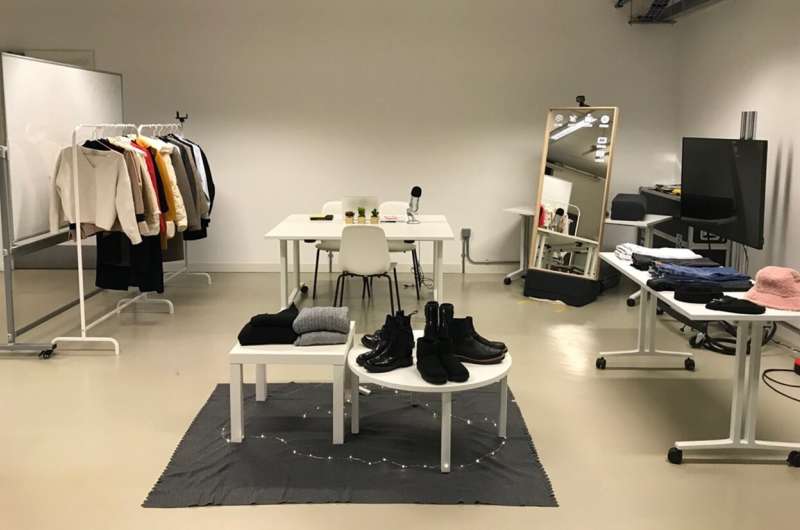Prototype AR shopping devices could benefit both consumers and retailers, says new study

Augmented reality (AR) could change the way we buy clothes in the future.
As the COVID pandemic has lessened, shoppers have become increasingly more comfortable with buying their clothes online rather than visiting shops. At the same time, Generation Z (born since 1997) consumers have grown up in a digital world and are far more comfortable buying products at the touch of a button rather than in a physical space.
But encouraging shoppers back into stores and away from e-commerce is essential for fashion retailers who want to maintain their “brand value.”
A new study by researchers from Loughborough University has found that AR can offer a lifeline to such businesses. The team tested two prototype AR shopping aides (AR Branded App and Magic Mirror), which were designed to encourage consumers to engage in physical shopping activities.
Dr. Chris Parker, of Loughborough’s Design School, said, “The AR development industry faces a problem… that designers’ current approach to AR is ineffective. If we can design better AR apps, retailers may adopt the technology for in- store use and increase customer footfall.”
Dr. Cathryn Hart, of Loughborough’s School of Business and Economics, said, “The aim of our study is to investigate consumer value of AR within high street retailers, evaluate current value (Magic Mirror and scanning items), and explore how AR can offer consumers better in-store experiences.”
The results of the study have been published in a new paper, How augmented reality can enhance fashion retail: A UX design perspective, in the journal International Journal of Retail & Distribution Management. It sets out ten design solutions for creating in-store AR shopping applications.
The study consisted of multiple phases:
The results showed that consumers have a positive attitude towards using AR when shopping.
It was also important to design AR apps to provide substantial functional benefits with enjoyment-oriented elements. This way, consumers can interact with products and receive more information.
Lastly, AR can help luxury brands tell a story from a hedonic perspective, enabling consumers to engage with the story while maintaining human interaction to ensure an elevated level of service quality.
Former Loughborough Ph.D. student Dr. Liangchao Xue, who now works at Dyson, said, “Retailers now face the challenge of developing a high-tech element to work with the customer journey. Our prototypes will meet shoppers’ utilitarian needs, but also increase hedonic value when shoppers interact with the prototype. This advantage is especially true for Magic Mirror that involves more interactive elements.
“However, retailers must consider store crowding caused by queuing for the mirror, and how to coordinate the efficient use of magic mirror and the fitting room. Therefore, to create a compelling shopping environment, this study suggests adopting a qualitative interface rather than a quantitative interface, allowing consumers to use marginal attention to perceive information quickly, rather than reading carefully with central attention. For example, put images of matching suggestions in marginal spaces rather than the text of product information. This would help users to complete tasks through simple contextual awareness, inference of user intent and user input minimization.”
Liangchao Xue et al, How augmented reality can enhance fashion retail: a UX design perspective, International Journal of Retail & Distribution Management (2022). DOI: 10.1108/IJRDM-09-2021-0435
Citation:
Prototype AR shopping devices could benefit both consumers and retailers, says new study (2022, December 14)
retrieved 14 December 2022
from https://techxplore.com/news/2022-12-prototype-ar-devices-benefit-consumers.html
This document is subject to copyright. Apart from any fair dealing for the purpose of private study or research, no
part may be reproduced without the written permission. The content is provided for information purposes only.
For all the latest business News Click Here

